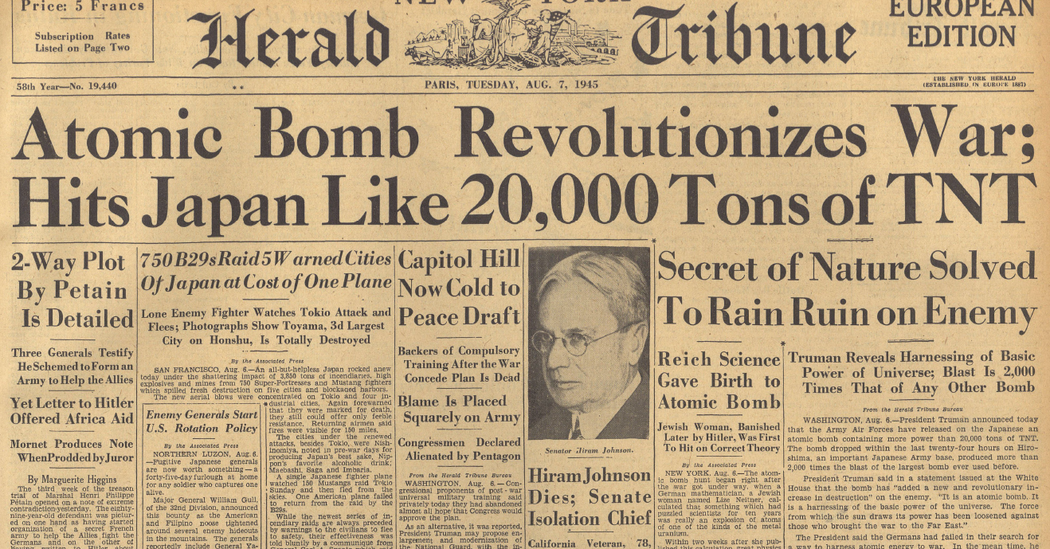News From April 1945: A Retrospective Analysis

Table of Contents
- The Yalta Conference and its Aftermath (February-April 1945): Setting the Stage for Post-War Europe
- The Final Stages of the European Theatre: The Fall of Berlin and the Demise of Nazi Germany
- The Pacific Theatre Intensifies: The Battle of Okinawa and its Significance
- Liberation and Horror: The Discovery of Nazi Concentration Camps
- The Death of Franklin D. Roosevelt: A Turning Point in Leadership
- Conclusion
The Yalta Conference and its Aftermath (February-April 1945): Setting the Stage for Post-War Europe
The Yalta Conference, held in February 1945, significantly shaped the post-war landscape of Europe. This meeting of Allied leaders – Franklin D. Roosevelt (United States), Winston Churchill (United Kingdom), and Joseph Stalin (Soviet Union) – aimed to coordinate the final stages of the war against Nazi Germany and plan for the postwar world. However, the seeds of the Cold War were already sown during these discussions.
-
Key Agreements: The conference addressed several critical issues, including the unconditional surrender of Germany, the establishment of the United Nations, and the division of Germany and its occupied territories amongst the Allied forces. Specific agreements on Poland's future and the Soviet Union's role in Eastern Europe proved highly contentious and laid the groundwork for future tensions.
-
Allied Tensions: Despite the common goal of defeating Nazi Germany, deep-seated distrust and conflicting geopolitical ambitions fueled considerable tension between the Allied powers. The Soviet Union's desire for a sphere of influence in Eastern Europe clashed with the Western Allies' vision of a more democratic and self-determining post-war order. These disagreements, barely masked during the conference, were harbingers of the forthcoming Cold War.
-
Eastern Europe's Future: The agreements made at Yalta significantly impacted the future of Eastern Europe. While presented as a compromise, the Soviet Union’s influence in the region solidified, paving the way for the establishment of Soviet-backed communist governments. This led to decades of political and ideological division across the continent.
-
Roosevelt's Health: President Roosevelt's deteriorating health during this period is a factor often overlooked in the analysis of the Yalta Conference. His weakened state may have impacted his ability to effectively negotiate with Stalin, potentially contributing to concessions that later proved problematic. The impact of April 1945 news regarding his health was significant in shaping the future political landscape.
The Final Stages of the European Theatre: The Fall of Berlin and the Demise of Nazi Germany
April 1945 witnessed the culmination of the Eastern Front's struggle, culminating in the brutal Battle of Berlin. The Soviet Red Army's relentless advance encircled the German capital, leading to intense street fighting and widespread destruction. This battle marked the final chapter in Nazi Germany's reign and the devastating end of the European theatre of World War II.
-
Soviet Offensive: The Soviet offensive on Berlin was a massive undertaking, involving a staggering number of troops and resources. The Red Army's superior manpower and relentless assault overwhelmed the weakened German defenses.
-
Street Fighting and Destruction: The fighting in Berlin was characterized by fierce close-quarters combat, resulting in the city's widespread destruction. Civilians bore the brunt of the fighting, suffering immense casualties and displacement.
-
Strategic Importance: Capturing Berlin held immense strategic significance, symbolizing the complete collapse of Nazi Germany and the defeat of Hitler's regime. The city's capture was a powerful blow to the morale of the remaining German forces.
-
Germany's Defeat: Several factors contributed to Germany's defeat, including the Allied bombing campaign, the Red Army's overwhelming strength, and the exhaustion of the German military. The collapse of Germany’s infrastructure and the loss of morale were equally significant.
-
Hitler's Death: The death of Adolf Hitler, on April 30th, marked a turning point in the battle and signified the imminent collapse of Nazi rule. His suicide, within the besieged Berlin bunker, removed the central figure of Nazi Germany, accelerating the process of surrender.
The Pacific Theatre Intensifies: The Battle of Okinawa and its Significance
While the European theatre was drawing to a close, the Pacific War raged on. The Battle of Okinawa, which began in April 1945, proved to be one of the bloodiest battles of the Pacific War, showcasing the ferocity of Japanese resistance and paving the way for the atomic bombings later in the year.
-
Strategic Importance: Okinawa’s strategic location was crucial to the planned invasion of Japan. Securing the island was considered essential for launching further attacks against the Japanese home islands.
-
Intense Fighting and Casualties: The battle was characterized by fierce fighting, resulting in staggering casualties on both sides. The Japanese employed kamikaze tactics, significantly impacting American naval forces.
-
Kamikaze Attacks: Kamikaze attacks played a pivotal role in the battle. The suicidal nature of these attacks caused heavy losses and added to the brutality of the fighting, highlighting the Japanese military's desperate determination.
-
Influence on Atomic Bomb Decision: The high casualty rate on Okinawa, alongside the anticipated massive losses of a full-scale invasion of Japan, significantly influenced the decision to utilize atomic bombs. The April 1945 news from Okinawa served as a critical factor in the ultimate decision to use nuclear weapons.
Liberation and Horror: The Discovery of Nazi Concentration Camps
April 1945 also witnessed the horrifying liberation of Nazi concentration camps by Allied forces. The discovery of the systematic extermination of millions of Jews and other victims of the Holocaust shocked the world and forever altered perceptions of the war.
-
Liberation of Camps: Allied troops, including American, British, and Soviet forces, liberated several major concentration camps, including Auschwitz-Birkenau. The images and testimony coming from those liberated camps were critical in the April 1945 news.
-
Nazi Atrocities: The scale of the atrocities discovered in these camps—the mass murder, starvation, and torture—was beyond comprehension. The evidence of systematic genocide profoundly impacted the world, revealing the true horrors of the Nazi regime.
-
Aftermath and Aid: The immediate aftermath involved providing essential aid to survivors, many of whom were severely traumatized and in desperate need of medical attention and psychological support. The work of liberation extended far beyond the physical act of freeing the prisoners.
-
Psychological Impact: The psychological impact of these discoveries on Allied soldiers and the global community was immense. The images and accounts of the atrocities helped to shape post-war attitudes towards human rights and the prevention of genocide.
The Death of Franklin D. Roosevelt: A Turning Point in Leadership
The death of President Franklin D. Roosevelt on April 12, 1945, marked a significant turning point in the war and in American leadership. His passing during the final stages of WWII had profound consequences, both domestically and internationally.
-
Impact on the War: Roosevelt's death created uncertainty and instability during a crucial time in the war. His extensive knowledge and experience with the Allied powers were lost, affecting the decision-making process.
-
Succession to Truman: The sudden succession of Harry S. Truman to the presidency thrust him into a demanding role with a multitude of complex issues and significant wartime decisions.
-
Truman's Immediate Challenges: Truman inherited the immense challenges of concluding the war in Europe and the Pacific, dealing with the complexities of the post-war world, and managing the emerging Cold War tensions. The news of the day impacted the way in which the war would end.
Conclusion
April 1945 was a month of both immense triumph and devastating loss, a period that irrevocably altered the course of history. The Allied victories in Europe and the continued fighting in the Pacific, coupled with the horrific revelations from concentration camps and the death of President Roosevelt, shaped the postwar world in profound ways. Understanding the events of April 1945 provides crucial context for comprehending the legacy of World War II and the challenges faced in the years that followed. To delve deeper into this pivotal moment in history, explore further resources on the key events and figures of April 1945 and its lasting impact on the global stage.

 Sadie Sink Age And Potential Spider Man 4 Role An Analysis
Sadie Sink Age And Potential Spider Man 4 Role An Analysis
 The Undervalued Asset Why Middle Managers Matter
The Undervalued Asset Why Middle Managers Matter
 Experience Our Great Yorkshire Life Exploring The Countys Hidden Gems
Experience Our Great Yorkshire Life Exploring The Countys Hidden Gems
 Uk Eurovision Act Makes Unexpected Statement Points Arent The Priority
Uk Eurovision Act Makes Unexpected Statement Points Arent The Priority
 Creating A Personalized Winter Weather Timeline
Creating A Personalized Winter Weather Timeline
